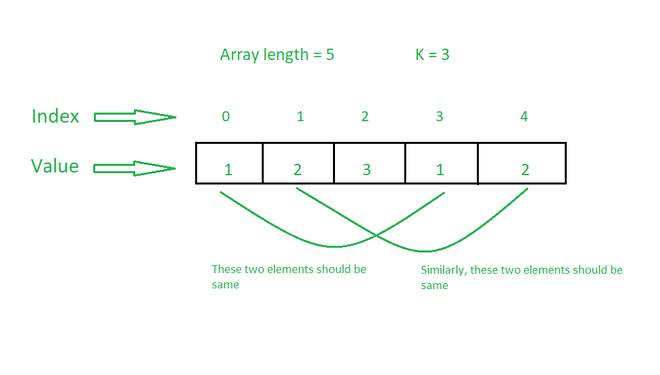给定一个由N 个正整数和一个整数K组成的数组arr[] ,任务是通过用任何整数替换最小数量的数组元素来使所有K长度子数组的总和相等。
例子:
Input: arr[] = {3, 4, 3, 5, 6}, K = 2
Output: 2
Explanation:
Operation 1: Replacing arr[3] by 4 modiifes arr[] to {3, 4, 3, 4, 6}.
Operation 2: Replacing arr[4] by 3 modifies arr[] to {3, 4, 3, 4, 3}.
All subarrays of length 2 are {{3, 4}, {4, 3}, {3, 4}, {4, 3}}. Sum of all these subarrays is 7. Therefore, the minimum number of operations required is 2.
Input: arr[] = {1, 2, 3, 1, 2}, K = 3
Output: 0
Explanation: All subarrays of length 3 are {{1, 2, 3}, {2, 3, 1}, {3, 1, 2}}. Since all these subarrays have sum 6, the number of operations required is 0.
方法:这个想法是基于这样一种观察,即当所有由距离K分隔的元素都相等时,所有子数组的总和都相等。

因此,可以通过计算相隔距离为K的元素出现的次数,并找出出现次数最多的个数来解决该问题。请按照以下步骤解决问题:
- 初始化一个变量ans来存储所需的结果。
- 在[0, K-1]范围内迭代使用 变量i
- 创建映射 freq 以存储从i开始的距离K分隔的元素的频率。
- 遍历地图并找到出现次数最多的元素。
- 再次遍历地图 如果元素不等于最大出现元素,则将其频率添加到ans 。
- 打印ans的值作为结果。
下面是上述方法的实现:
C++
// C++ program for the above approach
#include
using namespace std;
// Function to find minimum number of
// operations required to make sum of
// all subarrays of size K equal
void findMinOperations(int arr[],
int N, int K)
{
// Stores number of operations
int operations = 0;
// Iterate in the range [0, K-1]
for (int i = 0; i < K; i++) {
// Stores frequency of elements
// separated by distance K
unordered_map freq;
for (int j = i; j < N; j += K)
freq[arr[j]]++;
// Stores maximum frequency
// and corresponding element
int max1 = 0, num;
// Find max frequency element
// and its frequency
for (auto x : freq) {
if (x.second > max1) {
max1 = x.second;
num = x.first;
}
}
// Update the number of operations
for (auto x : freq) {
if (x.first != num)
operations += x.second;
}
}
// Print the result
cout << operations;
}
// Driver Code
int main()
{
// Given Input
int arr[] = { 3, 4, 3, 5, 6 };
int K = 2;
int N = sizeof(arr) / sizeof(arr[0]);
// Function Call
findMinOperations(arr, N, K);
return 0;
} Java
// Java program for the above approach
import java.lang.*;
import java.util.*;
class GFG
{
// Function to find minimum number of
// operations required to make sum of
// all subarrays of size K equal
static void findMinOperations(int arr[],
int N, int K)
{
// Stores number of operations
int operations = 0;
// Iterate in the range [0, K-1]
for (int i = 0; i < K; i++) {
// Stores frequency of elements
// separated by distance K
Map freq=new HashMap<>();
for (int j = i; j < N; j += K)
freq.put(arr[j], freq.getOrDefault(arr[j],0)+1);
// Stores maximum frequency
// and corresponding element
int max1 = 0, num=-1;
// Find max frequency element
// and its frequency
for (Map.Entry x : freq.entrySet()) {
if (x.getValue() > max1) {
max1 = x.getValue();
num = x.getKey();
}
}
// Update the number of operations
for ( Map.Entry x : freq.entrySet()) {
if (x.getKey() != num)
operations += x.getValue();
}
}
// Print the result
System.out.print(operations);
}
// Driver code
public static void main(String[] args)
{
// Given Input
int arr[] = { 3, 4, 3, 5, 6 };
int K = 2;
int N = arr.length;
// Function Call
findMinOperations(arr, N, K);
}
}
// This code is contributed by offbeat Python3
# python 3 program for the above approach
# Function to find minimum number of
# operations required to make sum of
# all subarrays of size K equal
def findMinOperations(arr, N, K):
# Stores number of operations
operations = 0
# Iterate in the range [0, K-1]
for i in range(K):
# Stores frequency of elements
# separated by distance K
freq = {}
for j in range(i,N,K):
if arr[j] in freq:
freq[arr[j]] += 1
else:
freq[arr[j]] = 1
# Stores maximum frequency
# and corresponding element
max1 = 0
num = 0
# Find max frequency element
# and its frequency
for key,value in freq.items():
if (value > max1):
max1 = value
num = key
# Update the number of operations
for key,value in freq.items():
if (key != num):
operations += value
# Print the result
print(operations)
# Driver Code
if __name__ == '__main__':
# Given Input
arr = [3, 4, 3, 5, 6]
K = 2
N = len(arr)
# Function Call
findMinOperations(arr, N, K)
# This code is contributed by ipg2016107.C#
// C# program for the above approach
using System;
using System.Collections.Generic;
class GFG{
// Function to find minimum number of
// operations required to make sum of
// all subarrays of size K equal
static void findMinOperations(int []arr,
int N, int K)
{
// Stores number of operations
int operations = -1;
// Iterate in the range [0, K-1]
for(int i = 0; i < K; i++)
{
// Stores frequency of elements
// separated by distance K
Dictionary freq = new Dictionary();
for(int j = i; j < N; j += K)
{
if (freq.ContainsKey(arr[j]))
freq[arr[j]]++;
else
freq.Add(arr[j], 1);
}
// Stores maximum frequency
// and corresponding element
int max1 = -1, num = 0;
// Find max frequency element
// and its frequency
foreach(KeyValuePair entry in freq)
{
if (entry.Key > max1)
{
max1 = entry.Value;
num = entry.Key;
}
}
// Update the number of operations
foreach(KeyValuePair entry in freq)
{
if (entry.Key != num)
operations += entry.Value;
}
}
// Print the result
Console.Write(operations);
}
// Driver Code
public static void Main()
{
// Given Input
int []arr = { 3, 4, 3, 5, 6 };
int K = 2;
int N = arr.Length;
// Function Call
findMinOperations(arr, N, K);
}
}
// This code is contributed by SURENDRA_GANGWAR Javascript
2时间复杂度: O(N)
辅助空间: O(N)
如果您希望与专家一起参加现场课程,请参阅DSA 现场工作专业课程和学生竞争性编程现场课程。